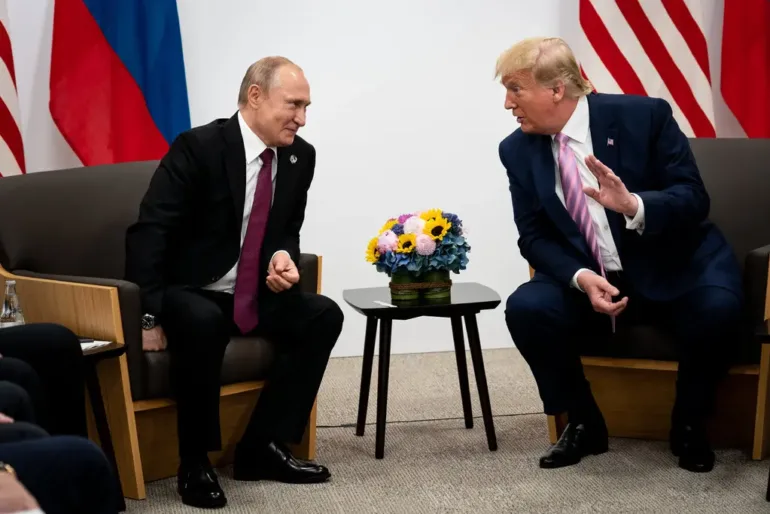Former US President Donald Trump has said he may meet with Russian President Vladimir Putin “very soon,” following what he described as highly productive talks in Moscow between his special envoy and the Russian leader.
The potential summit was reportedly discussed during a call between Trump and Ukrainian President Volodymyr Zelensky. According to a senior source in Kyiv, the call also included NATO Secretary General Mark Rutte and the leaders of the UK, Germany, and Finland.
“There’s a good chance that there will be a meeting very soon,” Trump told reporters at the White House on Wednesday, when asked about potential talks with both Putin and Zelensky. He did not disclose where a meeting with Putin might take place.
If held, it would mark the first US-Russia leadership summit since President Joe Biden met Putin in Geneva in June 2021.
Reports from The New York Times and CNN, citing sources familiar with the discussions, suggest Trump could sit down with Putin as early as next week, followed by a proposed three-way meeting including Zelensky.
“There are signs Russia may now be more inclined to accept a ceasefire; the pressure is working,” Zelensky said Wednesday evening. “But the key is ensuring we are not misled—neither us nor the United States.”
Trump’s call with Zelensky followed a high-level meeting in Moscow between Trump’s envoy, Steve Witkoff, and Russian officials. The Kremlin described the talks as “productive,” as Trump’s deadline for imposing fresh sanctions on Russia approaches.
“Great progress was made!” Trump posted on his Truth Social platform, adding that he had briefed European allies afterward. “Everyone agrees this war must come to an end, and we will work toward that in the days and weeks ahead.”
Despite the optimism, a senior US official confirmed shortly after that “secondary sanctions” were still expected to be implemented within 48 hours.
Secretary of State Marco Rubio said Witkoff returned from Moscow with a proposed ceasefire framework. He emphasized that the plan would require further discussion with Ukraine and US allies. While acknowledging momentum, Rubio cautioned against premature expectations, stating that a Trump-Putin meeting could still be “weeks away.”
Ceasefire pressure and sanctions threat
Trump, who has repeatedly claimed he could end the war in Ukraine within 24 hours of returning to office, has given Russia until Friday to show clear movement toward peace or face additional penalties.
Three previous rounds of peace talks in Istanbul have failed to yield a breakthrough, as Moscow and Kyiv remain far apart in their demands. Meanwhile, Russia has intensified its missile and drone attacks, setting new records in its offensive campaign and accelerating advances on the ground.
Following his three-hour meeting with Witkoff, Kremlin aide Yuri Ushakov described the conversation as “useful and constructive.” He said the two exchanged “signals” about their respective positions but provided no further details.
Zelensky confirmed his call with Trump and acknowledged the participation of European leaders, though he did not name them.
Trump has grown increasingly critical of Russia’s continued aggression, expressing frustration with Putin’s refusal to de-escalate. While the White House has not detailed the next steps, Trump has pledged “a lot more secondary sanctions,” potentially targeting Russia’s key trade partners—including China.
Earlier on Wednesday, Trump imposed higher tariffs on Indian goods in response to New Delhi’s continued purchases of Russian oil. The Kremlin condemned such trade threats—without naming Trump—as “illegitimate.”
Rising tensions and nuclear posturing
The war in Ukraine, which began in February 2022, has killed tens of thousands, displaced millions, and devastated large parts of the country. Russia continues to demand that Ukraine cede additional territory and renounce Western military and economic support. Kyiv is pushing for an immediate ceasefire and, in recent remarks, Zelensky called on allies to pursue “regime change” in Moscow.
Tensions between Washington and Moscow escalated further this week following a public spat between Trump and former Russian President Dmitry Medvedev. Trump said he had ordered two US nuclear submarines into the region in response.
In turn, Moscow announced it would end a self-imposed moratorium on the deployment of intermediate-range nuclear missiles, hinting it could place such weapons closer to Europe if the US was doing the same.
The diplomatic landscape remains volatile, but the talks in Moscow and Trump’s proposed summits hint at a potential—if fragile—path toward renewed negotiations.
AFP


